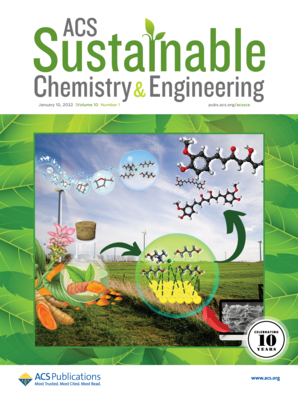有机无溶剂制备二氧化硅-烷氧基化聚乙烯亚胺吸附剂的研究
IF 7.1
1区 化学
Q1 CHEMISTRY, MULTIDISCIPLINARY
引用次数: 0
摘要
介孔二氧化硅负载的聚乙烯亚胺(PEI)和最近的烷氧基化PEI (APEI)是很有前途的CO2捕获吸附剂,具有很高的吸附能力和选择性。湿浸渍法是制备二氧化硅- pei的常用合成方法。然而,过量的有机溶剂,特别是甲醇,总是用于PEI烷氧基化和聚合物与二氧化硅的混合。本研究展示了一种有机无溶剂合成方法:1)硅酸钠溶液制备介孔二氧化硅,2)PEI烷氧基化,以及3)随后使用少量水浸渍二氧化硅-PEI,通常水与二氧化硅的质量比不超过1.0。对于大规模样品(高达5公斤)的制备,控制干燥是必不可少的,以保持约5 Wt.%的水分,保持二氧化碳捕获性能。通过控制烷氧基化化学和程度,可以为直接空气捕获(30°C)和工业过程(50°C)量身定制api。二氧化硅- apei具有增强的氧化稳定性和减少水分共吸附,从而延长了使用寿命,降低了再生能耗。这种水基合成消除了对甲醇等过量有机溶剂的需求,防止了挥发性有机化合物(VOC)的排放,减少了干燥能耗,提高了可持续性,使大规模生产在商业上可行。本文章由计算机程序翻译,如有差异,请以英文原文为准。

An Organic Solvent-Free Route for Preparing Silica-Alkoxylated Polyethylenimine Adsorbents for CO2 Capture
Mesoporous silica-supported polyethylenimine (PEI) and, more recently, alkoxylated PEI (APEI) are promising adsorbents for CO2 capture, displaying high adsorption capacity and selectivity. Wet impregnation is the established synthesis procedure for preparing silica-PEI. However, excessive quantities of organic solvents, particularly methanol, have invariably been used for both PEI alkoxylation and polymer mixing with silica. This study demonstrates an organic solvent-free synthesis method for 1) mesoporous silica preparation from sodium silicate solution, 2) PEI alkoxylation, and 3) the subsequent impregnation of silica-PEI using minimal water, typically with a water-to-silica mass ratio not exceeding 1.0. For large scale samples (up to 5 kg) preparation, controlled drying is essential to retain approximately 5 Wt.% moisture, preserving CO2 capture performance. APEIs can be tailored for direct air capture (30 °C) and industrial processes (50 °C) by controlling the alkoxylation chemistry and degree. Silica-APEI exhibits enhanced oxidative stability and reduced moisture coadsorption, which extend operational lifespan and lower regeneration energy consumption. This water-based synthesis eliminates the need for excess organic solvents, such as methanol, preventing volatile organic compound (VOC) emissions, reducing drying energy consumption, and enhancing sustainability, making large-scale production commercially viable.
求助全文
通过发布文献求助,成功后即可免费获取论文全文。
去求助
来源期刊

ACS Sustainable Chemistry & Engineering
CHEMISTRY, MULTIDISCIPLINARY-ENGINEERING, CHEMICAL
CiteScore
13.80
自引率
4.80%
发文量
1470
审稿时长
1.7 months
期刊介绍:
ACS Sustainable Chemistry & Engineering is a prestigious weekly peer-reviewed scientific journal published by the American Chemical Society. Dedicated to advancing the principles of green chemistry and green engineering, it covers a wide array of research topics including green chemistry, green engineering, biomass, alternative energy, and life cycle assessment.
The journal welcomes submissions in various formats, including Letters, Articles, Features, and Perspectives (Reviews), that address the challenges of sustainability in the chemical enterprise and contribute to the advancement of sustainable practices. Join us in shaping the future of sustainable chemistry and engineering.
 求助内容:
求助内容: 应助结果提醒方式:
应助结果提醒方式:


